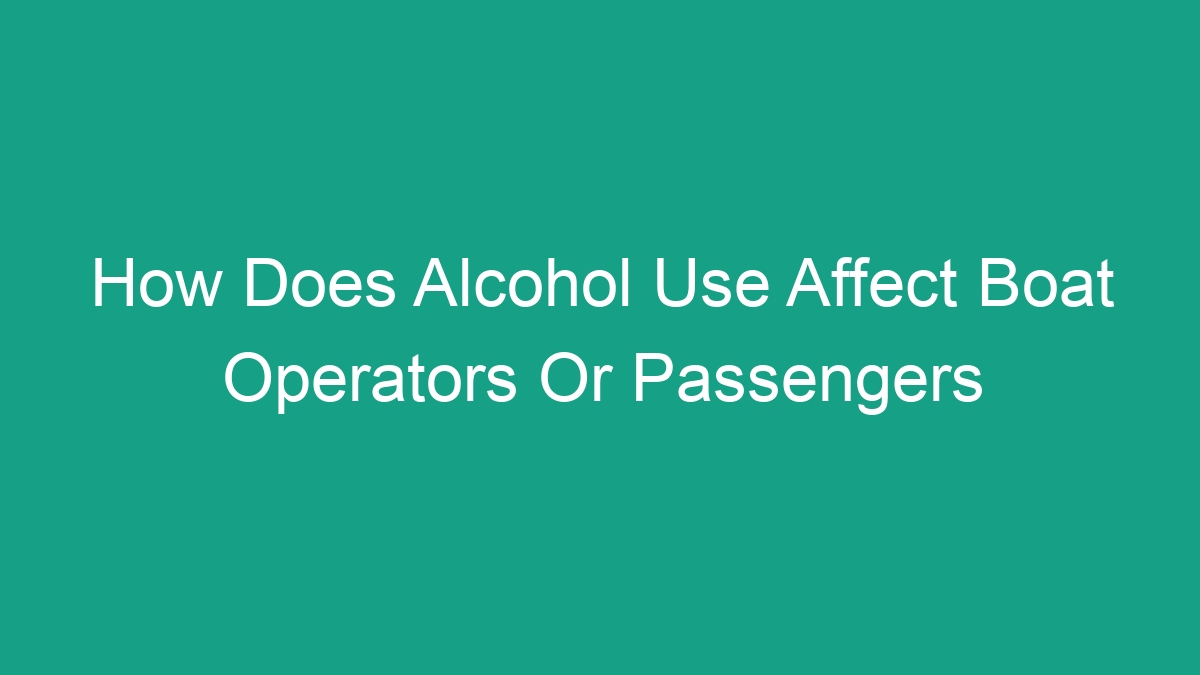
Alcohol use and boating may seem like a fun combination, but the reality is that it poses a serious risk to both boat operators and passengers. Operating a boat under the influence of alcohol can impair judgment, coordination, and reaction time, leading to an increased risk of accidents and fatalities on the water. Likewise, passengers who consume alcohol while boating also put themselves at risk of injury or even death. In this article, we will delve into the effects of alcohol use on boat operators and passengers, as well as the legal implications and safety measures associated with alcohol and boating.
Effects on Boat Operators
When a boat operator consumes alcohol, it can impair their ability to safely navigate the water. The following are some of the key effects of alcohol use on boat operators:
- Impaired Judgment: Alcohol consumption can impair a boat operator’s ability to make sound decisions and assess risks, leading to reckless behavior on the water.
- Decreased Coordination: Coordination is crucial for operating a boat effectively, and alcohol can significantly decrease a person’s coordination, making it difficult to steer the boat and maneuver safely.
- Reduced Reaction Time: Alcohol slows down reaction time, which is essential for avoiding collisions with other boats, obstacles, or people in the water.
- Reduced Vision and Hearing: Alcohol can impair a person’s vision and hearing, making it harder to see and hear potential hazards while boating.
- Risk of Capsizing or Sinking: Impaired judgment or coordination can lead to risky maneuvers that may result in the boat capsizing or sinking, endangering the lives of everyone on board.
These impairments significantly increase the likelihood of boating accidents and fatalities, making it crucial for boat operators to abstain from consuming alcohol while on the water.
Effects on Passengers
While it is typically the responsibility of the boat operator to ensure a safe and enjoyable boating experience, passengers who consume alcohol can also contribute to unsafe conditions on the water. The effects of alcohol use on passengers can include:
- Disorientation and Dizziness: Alcohol can cause passengers to feel disoriented and dizzy, increasing the risk of falling overboard or sustaining injuries while moving around the boat.
- Reduced Balance and Coordination: Intoxicated passengers may have difficulty maintaining their balance, especially on a moving boat, putting them at risk of slipping or falling.
- Increased Risk of Injury: Impaired judgment and slower reaction time can lead to risky behavior that may result in accidents or injuries to passengers or others on the water.
- Decreased Ability to Respond to Emergencies: In the event of an emergency, such as a person falling overboard or a collision, intoxicated passengers may be less able to respond effectively, putting themselves and others in danger.
It is important for passengers to be aware of the risks associated with alcohol consumption while boating and to prioritize their safety and the safety of others by drinking responsibly or abstaining from alcohol altogether.
Legal Implications
Operating a boat under the influence of alcohol is not only dangerous but also illegal in most jurisdictions. Just as with driving under the influence (DUI) laws, many states have specific laws and penalties for boating under the influence (BUI). These laws typically include the following consequences for individuals found to be operating a boat while intoxicated:
- Fines: Violators of BUI laws may face substantial fines, which can vary depending on the jurisdiction and the severity of the offense.
- Loss of Boating Privileges: Those convicted of BUI may face suspension or revocation of their boating privileges, impacting their ability to enjoy recreational boating activities in the future.
- Legal Proceedings: BUI offenses can lead to legal proceedings, including court appearances, trial, and potential incarceration for more serious violations.
- Criminal Record: A BUI conviction can result in a criminal record, which can have long-term consequences for employment, education, and other aspects of a person’s life.
It is important for boaters to be aware of and adhere to BUI laws to avoid legal repercussions and to promote safety on the waterways.
Safety Measures
To mitigate the risks associated with alcohol use while boating, several safety measures can be implemented by both boat operators and passengers:
- Designate a Sober Boat Operator: Prior to boating activities, ensure that a responsible and sober individual is designated as the boat operator to ensure safe navigation.
- Abstain from Alcohol: Boat operators and passengers should refrain from consuming alcohol while on the water to maintain clear judgment and coordination.
- Understand BUI Laws: Educate yourself about BUI laws and the legal implications of boating under the influence to comply with regulations and promote safe boating practices.
- Utilize Safety Equipment: Ensure that all required safety equipment, such as life jackets and emergency signaling devices, is readily available and in good working condition before embarking on a boating trip.
- Participate in Boating Safety Courses: Boaters and passengers can benefit from completing boating safety courses, which provide essential knowledge and skills for safe and responsible boating practices.
By implementing these safety measures, boaters and passengers can reduce the risk of accidents and injuries associated with alcohol use while boating, ultimately promoting a safe and enjoyable boating experience for everyone involved.
Conclusion
Alcohol use and boating do not mix. The impairments caused by alcohol can significantly increase the risk of accidents, injuries, and fatalities for both boat operators and passengers. It is essential for individuals engaged in boating activities to prioritize safety by abstaining from alcohol consumption and adhering to BUI laws and safety measures. By doing so, boaters and passengers can enjoy the water responsibly while minimizing the likelihood of negative outcomes associated with alcohol use on the water.




